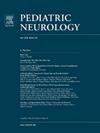Long-Term Outcome and Social-Intellectual Ability of Patients With Basal Ganglia Germinoma
IF 3.2
3区 医学
Q2 CLINICAL NEUROLOGY
引用次数: 0
Abstract
Background
In this study, we aimed at delineating the still ambiguous clinical characteristics and long-term outcomes of basal ganglia (BG) germinoma from the aspect of recurrence-free survival as well as social and intellectual activity.
Methods
We retrospectively reviewed medical records and imaging data for 12 patients with BG germinoma diagnosed and treated between 1996 and 2020, collecting the most recent status via medical records or telephone from the patients.
Results
The tumors involved the right and left sides and bilateral locations in three, seven, and two cases, respectively. The median follow-up period was 179 months. Six patients exhibited onset neuropsychologic symptoms, for example, cognitive decline or behavior disorder. We evaluated the intelligence quotient (IQ) in 10 patients and observed significantly lower IQ scores in six patients with neuropsychologic symptoms. Patients with right-sided lesions displayed average IQ levels (median 106), whereas those with left-sided or bilateral lesions had reduced IQ (median 67). A complete response was achieved by primary chemoradiotherapy in all patients. Three patients who underwent focal or whole-ventricle irradiation experienced recurrence, whereas no recurrence was observed in patients who received whole-brain irradiation (WBI). Concerning the neurocognitive outcomes, three and six patients with unilateral right and left lesions were living self-independently (Karnofsky Performance Status [KPS] ≧ 70), whereas the three remaining patients (one with left and two with bilateral lesions) had a dependent status (KPS <70).
Conclusions
WBI is crucial for disease control in BG germinoma. Furthermore, lesion laterality might affect neuropsychologic symptoms including IQ at diagnosis and neurocognitive outcomes in BG germinoma.
基底神经节生殖细胞瘤患者的长期预后和社会智力
在这项研究中,我们旨在从无复发生存以及社交和智力活动方面描述基底神经节(BG)生殖细胞瘤的临床特征和长期预后。方法回顾性分析1996年至2020年间诊治的12例BG生殖细胞瘤患者的病历和影像学资料,通过病历或电话收集患者的最新情况。结果肿瘤累及左、右、双侧分别3例、7例和2例。中位随访期为179个月。6例患者表现出认知能力下降或行为障碍等首发神经心理症状。我们对10例患者进行了智商评估,观察到6例有神经心理症状的患者智商得分明显降低。右侧病变患者表现出平均智商水平(中位数106),而左侧或双侧病变患者智商降低(中位数67)。所有患者均通过初次放化疗获得完全缓解。3例接受局灶或全脑室照射的患者出现复发,而接受全脑照射(WBI)的患者未出现复发。在神经认知结果方面,3例和6例单侧左右病变患者为独立生活(Karnofsky Performance Status [KPS]≧70),其余3例患者(1例左侧病变和2例双侧病变)为依赖状态(KPS <70)。结论swbi在BG生殖细胞瘤的疾病控制中起重要作用。此外,病变的偏侧性可能影响BG生殖细胞瘤的神经心理症状,包括诊断时的智商和神经认知结果。
本文章由计算机程序翻译,如有差异,请以英文原文为准。
求助全文
约1分钟内获得全文
求助全文
来源期刊

Pediatric neurology
医学-临床神经学
CiteScore
4.80
自引率
2.60%
发文量
176
审稿时长
78 days
期刊介绍:
Pediatric Neurology publishes timely peer-reviewed clinical and research articles covering all aspects of the developing nervous system.
Pediatric Neurology features up-to-the-minute publication of the latest advances in the diagnosis, management, and treatment of pediatric neurologic disorders. The journal''s editor, E. Steve Roach, in conjunction with the team of Associate Editors, heads an internationally recognized editorial board, ensuring the most authoritative and extensive coverage of the field. Among the topics covered are: epilepsy, mitochondrial diseases, congenital malformations, chromosomopathies, peripheral neuropathies, perinatal and childhood stroke, cerebral palsy, as well as other diseases affecting the developing nervous system.
 求助内容:
求助内容: 应助结果提醒方式:
应助结果提醒方式:


